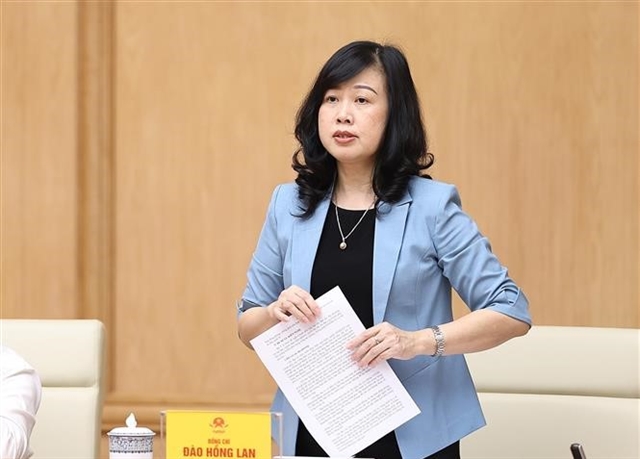 Society
Society

 |
| The current rates of insurance premium are "relatively low" compared to countries with similar socio-economic conditions, according to the minister. Photo baohaiduong.vn |
HÀ NỘI – The benefits covered by voluntary health insurance are "relatively comprehensive", while the current rates of insurance premium are "relatively low" compared to countries with similar socio-economic conditions, said Health Minister Đào Hồng Lan.
The minister responded to the concerns raised by citizens from several provinces regarding the 'excessively high' rate of voluntary health insurance premium and the need to reduce them to alleviate the economic burden on the public.
Before the 8th session of the 15th National Assembly, voters from southern Bạc Liêu Province raised a petition stating that the voluntary health insurance premiums, which have increased in line with base salary adjustments, posed difficulties for those who do not receive State budget salaries and have unstable incomes.
Therefore, voters suggested that the Ministry of Health needed to adjust regulations to create two different contribution levels for two distinct groups, ensuring a fair and reasonable approach to encourage public participation in voluntary health insurance across urban and rural areas.
Meanwhile, voters from Cần Thơ City requested the ministry adjust family-based contribution rates, as the current levels linked to new base salary adjustments are too high for families with low incomes who do not benefit from adjustments to the new salary scale.
Voters from Nghệ An Province called for reducing voluntary health insurance premiums to ease the economic burden on residents and ensure equitable access to social security policies.
Responding to these concerns, the minister explained that under current laws, the National Assembly and the Government had set the health insurance rate at 4.5 per cent of wages, pensions, disability allowances, unemployment benefits, or base salary, in view of the country's socio-economic conditions and the contributions from the State, businesses, workers and citizens.
To encourage and support participation, the Government had issued various decrees to subsidise health insurance premiums for disadvantaged groups, including the poor, near-poor, ethnic minorities, residents in extremely difficult economic areas and households engaged in agriculture, forestry, fisheries and salt production with average living standards, Lan said.
Under Decree No. 146/2018/NĐ-CP and supplements Article 13 of the Health Insurance Law, household contribution rates are as follows: the first person contributes 4.5 per cent of the base salary, the second, third and fourth contribute 70 per cent, 60 per cent and 50 per cent, respectively, of the first person's rate and from the fifth person onward, the contribution rate is 40 per cent of the first person's rate.
From July 1, 2024, the base salary increased from VNĐ1.8 million to VNĐ2.34 million (US$70.7 to US$92) per month, resulting in changes to household health insurance premium rates.
Accordingly, the first person's rate is VNĐ1,263,600 ($49.6) per year (an increase of VNĐ291,600 or $11.4). The second person's rate is VNĐ884,520 per year (an increase of VNĐ204,100), while the third person's is VNĐ758,160 per year (an increase of VNĐ174,900), the fourth's VNĐ631,800 per year (an increase of VNĐ145,800) and from the fifth person onward, the contribution will be VNĐ505,440 per year (an increase of VNĐ116,640).
Additionally, under Decree No. 75/2023/NĐ-CP, the provincial People's Committees, based on local budget capacity and other legal funding sources, can propose to the People's Councils higher contribution support levels for disadvantaged groups, or those not currently eligible for support.
The minister said that the current health insurance premium rates were "relatively low" and hoped voters would understand and support the policy. VNS